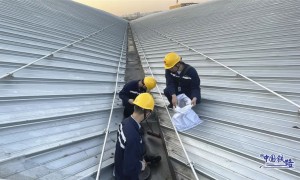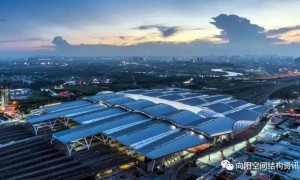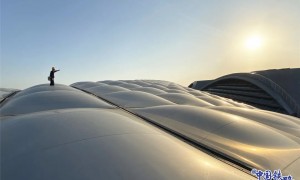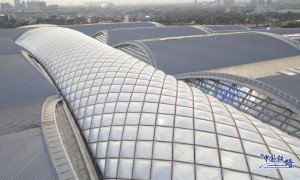Modern global trends in building construction are moving towards an increased use of steel, regardless of the building type. Steel offers many advantages over other construction materials at various stages of its lifecycle, from production and architecture to use in construction, not to mention its recyclability that can reach almost 100 %. In addition to these positive traits, fire protection of steel structures is also relatively less demanding than that of other materials.
However, steel also has some properties that make it a less than ideal material for construction use. More specifically, its sensitivity to corrosion and poor load-bearing capacity in case of fire might be considered two of its most problematic properties. Although steel is classified as a non-combustible material, increased temperature can cause it to lose some of the properties that make it popular in construction, causing it to deform and the steel structure to collapse in a very short time (Graph 1).
无论建筑类型如何,现代全球建筑建设趋势都在朝着增加使用钢材的方向发展。与其他建筑材料相比,钢在其生命周期的各个阶段都具有许多优势,从生产、建筑到建筑使用,更不用说它的可回收性几乎可以达到100%。除了这些优点外,钢结构的防火要求也相对较低。然而,钢也有一些特性,使它不太理想的建筑材料使用。更具体地说,它对腐蚀的敏感性和火灾时较差的承载能力可能被认为是其最成问题的两个特性。虽然钢被归为不燃材料,但温度升高会使其失去一些在建筑中流行的特性,导致其变形,钢结构在很短的时间内倒塌(图1)。
The essential issue at fire protection of steel structures is therefore the question of how to maintain the temperature of steel for a specified time under a certain limitation and how to maintain the required load-bearing capacity, deformations and elongations in case of increased temperature which occurs in the event of fire. The designer of fire safety is the one who shall determine the basic requirements for fire safety of the building. If he decides to design according to European regulations, the load-bearing capacity e.g. R 30, R 60, R 90, R 120, R 180, etc. may be required for the steel structure. The designation R ensures the load-bearing capacity of the steel structure for the indicated time period, given in minutes.
在钢结构防火的基本问题是因此如何指定时间保持钢的温度在一定限制下,如何保持所需的承载能力,变形和延伸率的增加温度时发生火灾。消防安全设计人员应当确定建筑物消防安全的基本要求。如果他决定按照欧洲规范设计,钢结构可能需要r30、r60、r90、r120、r180等承载能力。指定R确保钢结构在规定的时间内(以分钟为单位)的承载能力。
Selecting an appropriate system for fire protection of steel structures
Nowadays, there are different solutions available for the fire protection of steel structures. The following three systems are prevailing: intumescent fire stopping paints, cladding with fire stopping boards and fire stopping sprays. A majority of steel structures use intumescent paints – approx. 70%, while cladding with boards are used by approx. 25% and fire stopping sprays by approx. 3 %, (data for Great Britain, Tata Steel, Steel Construction Fire Protection 2013). In addition to the aforementioned systems, there are also some other systems, such as cladding with fire resistant sheets, the pouring of steel columns in concrete, partial pouring in concrete, the filling of columns with bricks made of foamed concrete and the pouring of beams halfway into the concrete ceiling. The use of these methods is decreasing.
目前,钢结构防火的解决方案多种多样。目前流行的防火涂料有三种:膨胀型防火涂料、外覆防火板和防火喷剂。大多数钢结构使用膨胀涂料-大约。70%,而覆层与板约使用。约25%及灭火喷雾。3%,(数据为英国塔塔钢铁,钢铁建筑防火2013年)。除了上述系统外,还有一些其他系统,如包覆与防火表、钢柱的浇筑混凝土,部分混凝土浇注,填充的列用砖头制成的泡沫混凝土的浇注梁已经进入混凝土天花板。这些方法的使用正在减少。
Intumescent paints
Intumescent paints are the most widely-used system because they:
-
represent the cheapest fire protection alternative;
-
-
maintain the original appearance of steel structure;
-
Furthermore, they can be applied already in the workshop or on site – depending on the paint type and weather conditions.
Intumescent fire stopping paints are either thin-layer paints, which are mostly water-based or solvent-based, or thick-layer paints which are epoxy-based and intended mainly for hydrocarbon fires. The thin-layer water-based intumescent paints are the prevailing system, especially due to their environment friendly production and use and due to the good properties of the cured layer. Prior to primer application the steel profiles should be sand-blasted to the grade Sa 2.5. When applying, a layer of compatible anti-corrosion primer should be applied first, followed by the intumescent paint and finally, in most cases, the protective layer – top coat, which may be a generally available covering paint for steel, but it should be compatible with the intumescent coating. In addition to protection against moisture, the protective layer also has an aesthetic purpose and comes in different colours.
膨胀涂料是应用最广泛的系统,因为它们代表了最便宜的消防替代品;有一层薄薄的;保持钢结构原有外观;是审美。此外,根据涂料类型和天气条件,它们可以在车间或现场使用。膨胀型防火涂料可以是薄层涂料,主要是水性或溶剂型涂料;也可以是厚层涂料,主要是环氧类涂料,主要用于碳氢化合物火灾。薄层水性膨胀涂料由于其环保的生产和使用,以及固化层的良好性能,成为目前的主流体系。涂底漆前,型钢应喷砂至Sa 2.5级。使用时应先涂一层相容的防腐底漆,然后涂一层膨胀漆,最后在大多数情况下涂一层保护层面漆,这可能是一种普遍适用的钢材覆盖漆,但应与膨胀漆相容。除防潮外,保护层还具有审美目的,颜色各异。
The intumescent paint works in the following way: when the temperature is increased, the structure of colour, with the help of catalysts such as phosphoric acid, expands and forms the carbon foam which expands in a ratio of 1:50. A typical layer 1 mm in thickness thus expands to a thickness of 50 mm. The usual dry film thicknesses depend on the individual requirements and may range from between 100 to 5000 microns. As the carbon foam is a good insulator, the speed of heat energy transfer to the steel beam is reduced and, as a result, the time in which a dangerous overheating occurs is significantly extended.
Regarding the limitations when using the fire stopping paint, we may take into consideration their sensitivity to the application conditions, for example when the rust is not sufficiently sand-blasted from the beams, when the paint is applied at too low a temperature (at temperatures below 10 °C the application is practically no longer possible), in rain or at dew point or when an incompatible basic top coat is used. They shall be applied by using the technology of airless spraying or manually by using rollers. For higher levels of fire resistance several layers are required. The application time might be a limitation as it should be taken into consideration that the intermediate drying of layers is required (usually 24 hours). Intumescent paints have a limited guaranteed service life and are relatively sensitive to abrasion and impacts. The fire resistance of intumescent paints may range from R 30 to R 180. It is the most advisable to use R 60 as the maximum. Above that value the number of layers and the thickness are irrational and also actual reliability in case of a real fire decreases as the layers fall off. Furthermore, it is necessary to mention the particular feature at testing the fire stopping paints, namely, the tests performed at opened profiles I, H and U are not valid on hollow profiles and vice versa. It should be checked previously if the manufacturer has one or the other test or both at the same time. In order to be allowed for use in the EU, the intumescent fire stopping paints should be tested according to EN 13381-8, their combustibility should be classified according to EN 13501-1 and they should be classified for resistance class according to EN 13501-2. They should also have the European Technical Assessment (ETA) according to ETAG 018, the certificate of constancy of the product (COC), which all together permits issuing the CE mark, or any other proofs in accordance with the Regulation on Construction Products.
膨胀涂料的工作原理是:当温度升高时,颜色结构在磷酸等催化剂的作用下膨胀,形成膨胀率为1:50的碳泡沫。一个典型的1毫米厚的层因此扩展到50毫米厚。通常的干膜厚度取决于个人的要求,可能在100至5000微米之间。由于泡沫炭是一种良好的绝缘体,它降低了向钢梁传递热能的速度,从而大大延长了发生危险过热的时间。关于限制使用火停止油漆时,我们可以考虑他们的敏感性的应用条件,例如当锈不够从梁、喷砂油漆时在过低的温度(温度低于10 C应用程序几乎是不可能的),在雨中或在露点或当一个不兼容的基本使用表面涂层。应采用无气喷涂技术或使用滚筒手动喷涂。为了提高防火等级,需要几层。应用时间可能是一个限制,因为它应该考虑到中间层干燥是必要的(通常24小时)。膨胀涂料具有有限的使用寿命保证和相对敏感的磨损和影响。膨胀涂料的防火性能从r30到r180不等。使用r60作为最大值是最明智的。高于这个值的层数和厚度是非理性的实际可靠性的一个真正的火也减少层脱落。此外,有必要提到的特定功能测试火停止油漆,即测试执行打开配置文件我,H和U是无效的空心型材,反之亦然。如果制造商同时进行一项或另一项测试,则应事先检查。为了能够在欧盟使用,膨胀型防火涂料应按EN 13381-8进行测试,其燃烧性能应按EN 13501-1进行分类,其耐火性应按EN 13501-2进行分类。他们还应该有欧洲技术评估(ETA),根据ETAG 018,产品的稳定性证书(COC),所有的许可证颁发CE标志,或任何其他证明,按照建筑产品的规定。
Fire stopping boards
Fire stopping boards are the next system for the protection of steel structures. Typically, they are mineral boards (i.e. made of calcium silicate) reinforced with fibers and fillers. Depending on the manufacturer they can also be resistant to humidity and frost and can be processed and/or painted with decorative paints. The board thicknesses depend on the manufacturer and the fire protection level and ranges from 10 mm to 60 mm. The boards are installed on site and are suitable for R30 to R180, whereby the use from R60 on is recommended, mainly due to higher price. The procedures for processing and installation are relatively simple (cutting with a saw, screwing, stapling). As there are no specific time and temperature limitations, the boards can be applied throughout the whole season. Fire stopping boards are the most reliable fire protection of steel structures, which has also been proven in real circumstances. Fire stopping boards should be tested according to EN 13381-4, their combustibility should be classified according to EN 13501-1 and their fire resistance class according to EN 13501-2. They should also have the European Technical Assessment ETA according to ETAG 018, the certificate of constancy of the product (COC), which all together permits issuing the CE mark, or any other proofs in accordance with the Law on Construction Products.
防火板是钢结构下一种防护体系。通常,它们是用纤维和填料加固的矿物板(即由硅酸钙制成)。根据制造商的不同,它们还可以抗潮湿和霜冻,可以加工和/或用装饰性油漆涂。板厚取决于制造商和防火等级,范围从10毫米到60毫米。该板安装在现场,适用于R30 – R180,建议从R60开始使用,主要原因是价格较高。加工和安装的程序相对简单(用锯子切割、螺旋、钉合)。由于没有具体的时间和温度限制,可以在整个季节使用。挡火板是钢结构最可靠的防火材料,在实际应用中也得到了证实。防火板应按EN 13381-4进行测试,其可燃性按EN 13501-1进行分类,其耐火等级按EN 13501-2进行分类。他们还应该根据ETAG 018的欧洲技术评估ETA,产品的稳定性证书(COC),所有的许可证颁发CE标志,或任何其他证明,根据建筑产品的法律。
In addition to direct cladding, other options are also possible with fire stopping boards. In practice, it can often happen that the cladding of the ceiling structure is too complex or too expensive. In such cases, depending on the given situation, a fire stopping membrane can be made.
This is especially useful with composite structures or truss, which are always difficult to protect. When selecting such systems, caution is required as the fire stopping membrane should meet the specific requirements and should be, in case of a horizontal membrane, tested in accordance with EN 13381-1, which ensures the classification of the structure load-bearing capacity Class R … or tested in accordance with EN 1365-2, which ensures the load-bearing capacity and fire resistance REI…
Attention: The systems of fire stopping membranes which are tested according to EN 1364- 2 are not sufficient in this cases, as they have the fire resistance EI … and do not provide the load-bearing capacity of the structure.
除了直接包覆外,防火板也有其他选择。在实践中,天花板结构的包层往往过于复杂或过于昂贵。在这种情况下,根据给定的情况,可以制作防火膜。这对于复合结构或桁架尤其有用,因为它们总是很难保护。在选择这类系统时,需要谨慎,因为防火膜应满足特定要求,对于水平膜,应按照EN 13381-1进行测试,以确保结构承载能力等级R…或按照en1365 -2进行测试,以确保其承载能力和防火性能。注意:根据en1364 – 2测试的防火膜系统在这种情况下是不够的,因为它们具有防火EI,不能提供结构的承载能力。
Fire stopping sprays
Fire stopping sprays consist of cement fibres, vermiculite and plaster. They are particularly suitable for the structures where aesthetics is not so important, although the appearance may be corrected with an optional final façade coat. Prior to application the steel may be coated with a primer, although this is not necessary, whereas the binding layer of an acrylic copolymer is required. The spray is applied on site by machine spraying and the layer of thickness ranges from between 10 and 70 mm. The worksite may be quite dirty. For a larger layer of thickness, an additional reinforcing mesh is required. The main advantage of fire stopping sprays is low price and good sound absorption. Fire stopping sprays can reach a fire resistance of up to R 240.
灭火喷雾由水泥纤维、蛭石和灰泥组成。它们特别适用于美学不那么重要的结构,尽管外观可以通过可选的最终立面涂层进行纠正。在使用之前,钢材可以涂上一层底漆,虽然这不是必须的,但是丙烯酸共聚物的结合层是必须的。现场采用机器喷涂,喷涂层厚度在10 – 70mm之间。工地可能很脏。对于较大的厚度层,需要额外的补强网。灭火喷雾的主要优点是价格低廉、吸声性能好。灭火喷雾可以达到高达r240的防火性能。









